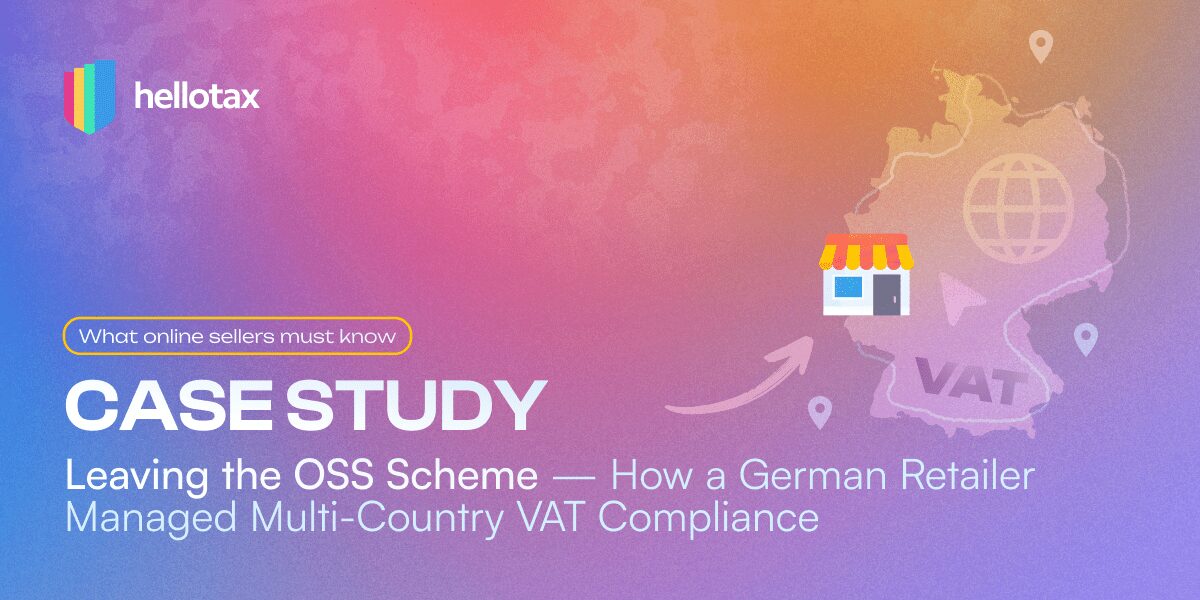
The timing of VAT registration for your business is more than just a matter of convenience – it has a significant impact on your tax obligations. You may find VAT registrations confusing when you find yourself in a situation where your business activities come before your VAT registration. Here is where VAT backdating registration and filings come in. Businesses operating in different European countries must understand the rules and implications of backdating VAT registrations. This blog concisely examines backdated VAT registrations and filings across Europe. Having a solid understanding of these key rules is crucial for businesses operating internationally.
Maria
Last Updated on 5 February 2024What is backdated VAT registration?
Backdated VAT registration is a process that businesses may need to undertake when they have commenced selling goods before completing their VAT registration. This differs from a regular VAT registration, where selling activities start only after the VAT registration is finalized. Backdating your VAT registration means registering from a date in the past, and aligning your tax obligations with the actual start of your commercial activities.
However, the conditions and feasibility of backdating VAT registrations vary significantly across European countries. Let’s delve into the specifics of each country.
Austria
A backdated registration with a date in the past is not possible in Austria. The VAT registration always takes place on the date on which the documents were submitted. However, after the registration is it possible to do backdated VAT filings, but be aware of potential penalties for late filings.
Germany
Similar to Austria, Germany doesn’t permit backdated registrations. The VAT registration date should be the date of document submission but take into consideration that the date may be conditioned by the Tax Office procedures that always have the last word. Post-registration, businesses can file backdated VAT returns, with the usual caution about late filing penalties.
United Kingdom
The UK offers more flexibility, allowing backdated VAT registrations as long as there is proof of sales, like invoices and VAT reports.
Spain
In Spain, backdated VAT registration is possible without specific conditions. However, penalties are a significant consideration, including:
- 1% of the VAT due for each month of delay for quarterly returns.
- Fixed penalties for missing transaction reports and annual VAT returns.
Poland
Poland permits backdating if you can demonstrate economic activity in the country, typically through transaction records. However, transferring from another tax agent to hellotax won’t allow for backdated registrations.
Netherlands
Backdated Filings: Similar to Austria, Germany does not allow backdated registrations.
Italy
Backdating is possible in Italy, but it depends on specific deadlines:
- Before April 15: You can backdate VAT registration to January 1 of the previous year if the registration is completed before April 15 of the current year. This allows businesses to retrospectively comply with VAT obligations for the previous year.
- After April 15: Backdating is not possible once this deadline has passed. If you register for VAT after April 15, Hellotax can only offer registration starting from January 1 of the current year, and no retroactive adjustments can be made for the previous year.
It’s important to note that while backdating provides flexibility, it is subject to strict deadlines. Late submissions, whether for registration or annual VAT declarations, may result in fines and penalties.
France/ Belgium
Both France and Belgium follow similar rules that allow backdated VAT registrations.
Czech Republic
Backdated registrations are possible in the Czech Republic, provided there’s proof of sales, like invoices and VAT reports.

Book a free consultation
Our VAT experts are happy to help you. Book a free consultation today!
VAT backdating registration and filings
If your business started selling goods before VAT registration in a specific country, you’ll need to initiate backdated VAT filings. This is applicable in all the countries discussed, but it’s important to remember that late filings or payments can lead to penalties.
Each country has unique regulations and potential penalties for late filings, which are crucial for businesses to be aware of.
Austria
- Backdated Filings: In Austria, while you cannot opt for a backdated VAT registration, backdated VAT filings are permissible.
- Penalties: Be mindful of penalties for late filings.
Germany
- Backdated Filings: Similar to Austria, Germany does not allow backdated registrations, but businesses can submit backdated VAT filings.
- Penalties: Late filing penalties are applicable.
United Kingdom
- Backdated Filings: The UK is more flexible, permitting both backdated VAT registrations and filings.
- Penalties: Penalties for late filings can occur.
Spain
- Backdated Filings: Backdated VAT registration and filings are possible in Spain.
- Penalties: As previously noted, penalties include 1% of the VAT due for each month of delay, among others.
Poland
- Backdated Filings: Poland allows backdated registrations and filings with proof of economic activity.
- Restrictions: If VAT registration was initiated by another tax agent, hellotax cannot process backdating.
- Penalties: Late filing penalties are applicable.
Netherlands
- Backdated Filings: Similar to Austria, Germany does not allow backdated registrations, but businesses can submit backdated VAT filings.
- Penalties: Late filing penalties are applicable
Italy
- Backdated Filings: The Italian tax system does allow for backdated VAT filings under certain conditions. This means that a business can file VAT returns for a previous period, subject to specific rules and deadlines.
- Extended submission period: Italy provides a two-year window for submitting VAT declarations for a previous year. For example, the VAT declaration for 2023 can be submitted up until December 31, 2025.
- Deadline for Filing: The annual VAT declaration should be filed by April 30th of the year following the reporting year. For instance, VAT for the year 2023 should be declared by April 30, 2024.
- Backdating Filing: In cases where a business needs to file VAT returns for a previous period, they can do so until April 30th of the following year. This allows businesses to rectify any missed or incorrect VAT submissions for the previous year.
- Penalties for Late Submission: Filing VAT returns after the deadline (April 30th of the year following the reporting year) may result in penalties and fines. The Italian tax authorities enforce these rules strictly.
France
- Backdated Filings: France allows for backdated VAT filings.
- Penalties: Penalties for late filings can occur.
Czech Republic
- Backdated Filings: The Czech Republic permits backdated registrations and filings, provided there’s proof of sales.
- Penalties: Penalties for late filings are applicable.
Key Takeaways for VAT backdating registration and filings
- Understand each country’s regulations: Familiarize yourself with the specific rules for backdated VAT filings in each European country.
- Be aware of the penalties: Late filings can lead to significant penalties, reinforcing the need for timely compliance.
- Professional guidance: Consulting with experts like hellotax is advisable to navigate these complexities effectively.
For businesses operating across Europe, understanding backdated VAT registrations is crucial. Each country has its specific regulations, and staying informed is key to ensuring compliance and avoiding unnecessary penalties. If you’re in a position where backdated VAT registration is a consideration, remember to act promptly and seek expert advice to guide you through the process.
For more insights and assistance on VAT backdating registration and filings and other tax-related matters, feel free to reach out to the experts from hellotax. We’re here to help your business navigate the complexities of VAT regulations across Europe.


